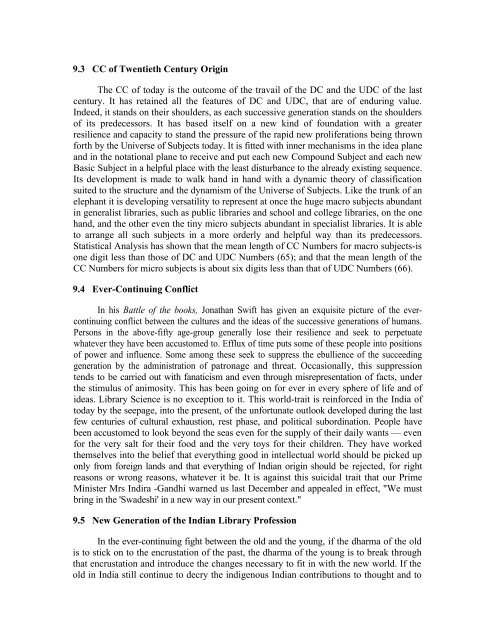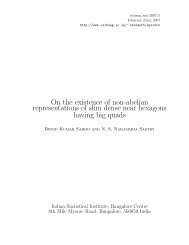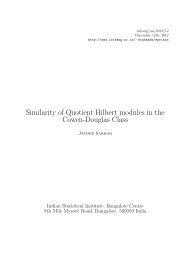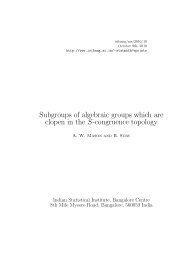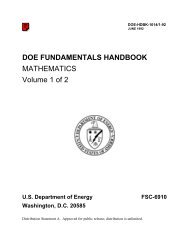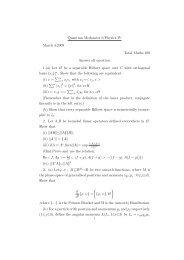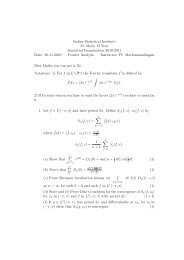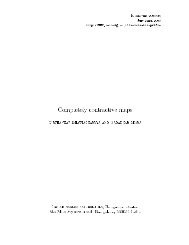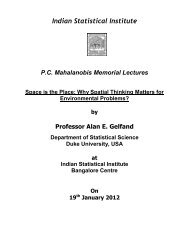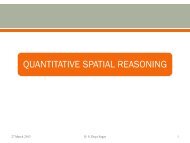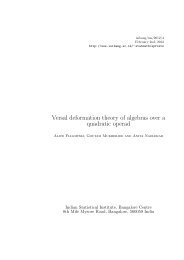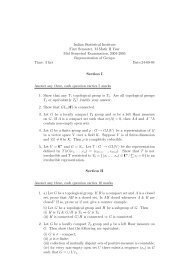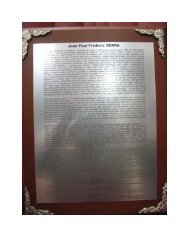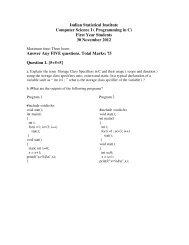CHOICE OF SCHEME FOR CLASSIFICATION - Indian Statistical ...
CHOICE OF SCHEME FOR CLASSIFICATION - Indian Statistical ...
CHOICE OF SCHEME FOR CLASSIFICATION - Indian Statistical ...
Create successful ePaper yourself
Turn your PDF publications into a flip-book with our unique Google optimized e-Paper software.
9.3 CC of Twentieth Century Origin<br />
The CC of today is the outcome of the travail of the DC and the UDC of the last<br />
century. It has retained all the features of DC and UDC, that are of enduring value.<br />
Indeed, it stands on their shoulders, as each successive generation stands on the shoulders<br />
of its predecessors. It has based itself on a new kind of foundation with a greater<br />
resilience and capacity to stand the pressure of the rapid new proliferations being thrown<br />
forth by the Universe of Subjects today. It is fitted with inner mechanisms in the idea plane<br />
and in the notational plane to receive and put each new Compound Subject and each new<br />
Basic Subject in a helpful place with the least disturbance to the already existing sequence.<br />
Its development is made to walk hand in hand with a dynamic theory of classification<br />
suited to the structure and the dynamism of the Universe of Subjects. Like the trunk of an<br />
elephant it is developing versatility to represent at once the huge macro subjects abundant<br />
in generalist libraries, such as public libraries and school and college libraries, on the one<br />
hand, and the other even the tiny micro subjects abundant in specialist libraries. It is able<br />
to arrange all such subjects in a more orderly and helpful way than its predecessors.<br />
<strong>Statistical</strong> Analysis has shown that the mean length of CC Numbers for macro subjects-is<br />
one digit less than those of DC and UDC Numbers (65); and that the mean length of the<br />
CC Numbers for micro subjects is about six digits less than that of UDC Numbers (66).<br />
9.4 Ever-Continuing Conflict<br />
In his Battle of the books, Jonathan Swift has given an exquisite picture of the evercontinuing<br />
conflict between the cultures and the ideas of the successive generations of humans.<br />
Persons in the above-fifty age-group generally lose their resilience and seek to perpetuate<br />
whatever they have been accustomed to. Efflux of time puts some of these people into positions<br />
of power and influence. Some among these seek to suppress the ebullience of the succeeding<br />
generation by the administration of patronage and threat. Occasionally, this suppression<br />
tends to be carried out with fanaticism and even through misrepresentation of facts, under<br />
the stimulus of animosity. This has been going on for ever in every sphere of life and of<br />
ideas. Library Science is no exception to it. This world-trait is reinforced in the India of<br />
today by the seepage, into the present, of the unfortunate outlook developed during the last<br />
few centuries of cultural exhaustion, rest phase, and political subordination. People have<br />
been accustomed to look beyond the seas even for the supply of their daily wants — even<br />
for the very salt for their food and the very toys for their children. They have worked<br />
themselves into the belief that everything good in intellectual world should be picked up<br />
only from foreign lands and that everything of <strong>Indian</strong> origin should be rejected, for right<br />
reasons or wrong reasons, whatever it be. It is against this suicidal trait that our Prime<br />
Minister Mrs Indira -Gandhi warned us last December and appealed in effect, "We must<br />
bring in the 'Swadeshi' in a new way in our present context."<br />
9.5 New Generation of the <strong>Indian</strong> Library Profession<br />
In the ever-continuing fight between the old and the young, if the dharma of the old<br />
is to stick on to the encrustation of the past, the dharma of the young is to break through<br />
that encrustation and introduce the changes necessary to fit in with the new world. If the<br />
old in India still continue to decry the indigenous <strong>Indian</strong> contributions to thought and to


